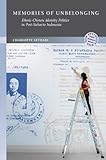Memories of Unbelonging : Ethnic Chinese Identity Politics in Post-Suharto Indonesia / Charlotte Setijadi.
Material type: TextSeries: New Southeast Asia: Politics, Meaning, and MemoryPublisher: Honolulu : University of Hawaii Press, [2023]Copyright date: ©2023Description: 1 online resource (280 p.) : 10 b&w illustrationsContent type:
TextSeries: New Southeast Asia: Politics, Meaning, and MemoryPublisher: Honolulu : University of Hawaii Press, [2023]Copyright date: ©2023Description: 1 online resource (280 p.) : 10 b&w illustrationsContent type: - 9780824896058
- 305.89510598 23//eng/20230506eng
- online - DeGruyter
| Item type | Current library | Call number | URL | Status | Notes | Barcode | |
|---|---|---|---|---|---|---|---|
 eBook
eBook
|
Biblioteca "Angelicum" Pont. Univ. S.Tommaso d'Aquino Nuvola online | online - DeGruyter (Browse shelf(Opens below)) | Online access | Not for loan (Accesso limitato) | Accesso per gli utenti autorizzati / Access for authorized users | (dgr)9780824896058 |
Frontmatter -- Contents -- Illustrations -- Preface and Acknowledgments -- Abbreviations and Acronyms -- Note to the Reader -- Maps -- Introduction -- 1. The Politics of Remembering -- 2. Enclaves and Narratives of Trauma in Everyday Life -- 3. (Re)learning Chineseness -- 4. Performing Trauma and Indonesian Chineseness -- 5. Chinese Indonesian Organizations and Political Participation -- 6. Chinese Indonesians in the Time of China’s Rise -- Conclusion -- Glossary of Non-English Terms -- Notes -- References -- Index -- About the Author
restricted access online access with authorization star
http://purl.org/coar/access_right/c_16ec
The ethnic Chinese have had a long and problematic history in Indonesia, commonly stereotyped as a market-dominant minority with dubious political loyalty toward Indonesia. For over three decades under Suharto’s New Order regime, a cultural assimilation policy banned Chinese languages, cultural expression, schools, media, and organizations. This policy was only abolished in 1998 following the riots and anti-Chinese attacks that preceded the fall of the New Order. In the post-Suharto era, Chinese Indonesians were finally free to assert their Chineseness again. But how does an ethnic group recover from the trauma of assimilation and regain a lost cultural identity?Memories of Unbelonging is an ethnographic study of how collective memories of state-sponsored ethnic discrimination have shaped Chinese identity politics in Indonesia. Combining case studies, in-depth primary data, and incisive analysis of Indonesia’s contemporary political landscape, anthropologist Charlotte Setijadi argues that trauma narratives are at the core of modern Chinese identity politics. Examining spaces and domains such as residential enclaves, educational institutions, the creative arts, and politics, this book paints a vivid picture of how different generations of Chinese Indonesians make sense of their historical trauma, ethnic identity, and belonging in a post-assimilation environment. Far from being passive victims of history, the ethnic Chinese are actively challenging old stereotypes and boundaries of acceptable Chineseness in the country.This emphasis on group and individual agency marks a strong departure from structural analyses of Chinese Indonesians that mostly highlight their disempowerment as an oppressed minority. Furthermore, placing the analysis within the broader context of China’s rise in the twenty-first century demonstrates how the combination of persisting local anti-Chinese sentiments and renewed pride over China’s growing global dominance have prompted many Chinese Indonesians to re-evaluate their sense of ethnic and national belonging. By focusing on the nexus between collective memory, local identity politics, and the rise of China as an external factor, Memories of Unbelonging offers new perspectives of understanding about Chinese Indonesians, post-Suharto Indonesian society, and the relationship between China and ethnic Chinese communities in Southeast Asia.
Mode of access: Internet via World Wide Web.
In English.
Description based on online resource; title from PDF title page (publisher's Web site, viewed 06. Mrz 2024)


